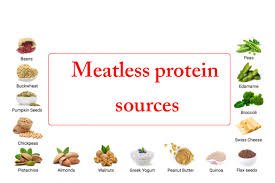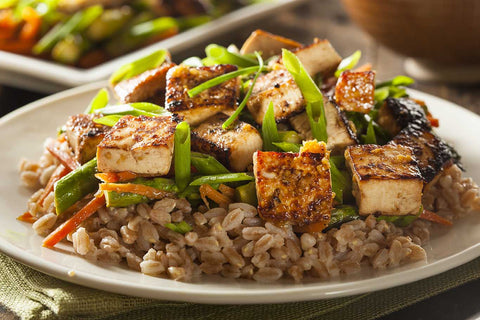Go Meatless for Your Protein

Go Meatless for Your Protein

Maybe you’ve decided you want to go meatless once in a while. It could be for health reasons, environmental reasons, or maybe you want to save a little cash. Even if you’re going meatless only occasionally, your meals will be more satisfying if you get in a good dose of protein. Milk products and eggs will work, of course, but if you want to go strictly with plant proteins, you might be hard-pressed to think of anything beyond rice, beans or veggie burgers. So, here’s a rundown of a few less well-known plant proteins that you might want to try.
Types of Plant Proteins
Many people are familiar with tofu, which is basically cheese that’s made from soy milk. It’s available in textures ranging from very soft to very firm. Soft tofu works great in smoothies and shakes, while firmer tofu can be marinated and grilled for a tasty meat substitute. You can also freeze it. When you thaw it out, it releases its liquid and crumbles, so it makes a good substitute for ground meat. Calories and protein content vary: generally speaking, the firmer the tofu, the higher the protein content. Six ounces of extra-firm tofu have about 90 calories and 12 grams of protein.
There’s another tofu product you may not be familiar with—tofu skin, or yuba. Yuba forms on top of the soy milk when it’s heated in the tofu-making process, not unlike the skin that forms on top of regular milk when it’s heated in a saucepan to make cocoa. It’s usually sold dried, so it needs to be soaked in water before use. But if you can find fresh yuba, you’re in for a treat. These thin, pliable tofu sheets can be cut into thin strips and added like noodles to soups or stir-fries. Or you can use yuba in place of a tortilla to make a wrap. Three ounces of ready-to-eat yuba have about 150 calories and 21 grams of protein.
Tempeh is similar to tofu in that it is made from soy. It’s made from the whole bean, not just the soy milk, which gives it a firmer, chewier texture. The soybeans are fermented, too, which gives tempeh an earthier flavor that’s usually described as nutty, meaty and mushroomy. Another plus: the fermentation reduces a lot of the gassiness that often comes with eating soybeans. Tempeh freezes well, and you can also grate it to use in dishes that call for ground meat. Tempeh is sold refrigerated, and three ounces have about 16 grams of protein and 170 calories.
If you’ve ever eaten at an Asian restaurant and seen ‘mock duck’ on the menu, it’s usually referring to seitan, or ‘wheat meat’—so called because seitan is made of wheat gluten. Seitan is usually found in the grocery store as a refrigerated block that you can slice or dice before cooking. Seitan can be baked, steamed, fried or simmered in a soup or stew. Since it has very little flavor of its own, it picks up the taste of whatever it’s cooked with. Three ounces of seitan have 90 calories and about 18 grams of protein. It should go without saying that if you’re gluten sensitive, this would not be the protein for you.
You may be less familiar with Mycoprotein, derived from a microfungus that’s cultured and grown in large vats. It’s not unlike the way yeast (also a fungus) is cultured to produce the familiar product we use for baking. The mycoprotein is then incorporated into all sorts of meat alternatives that have a texture very similar to chicken and a mild mushroom-like taste. Most offer at least 10 grams of protein per serving, but calories can range from 90 per serving to more than 200, depending on the item. If you’re vegan, read labels carefully—some mycoprotein products contain egg white as a binder.
